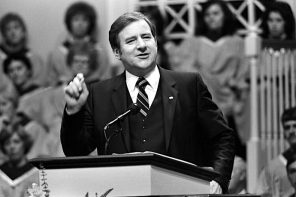Over at AlterNet, Adele Stan, who understands this stuff from the deep and long view, not just based on what happened yesterday, points to O’Donnell’s victory, as well as that of some other tea party-backed candidates, as further evidence that the tea party is not a secular movement. (A favorite RD topic, of course.)
Stan wrote an even more comprehensive piece on Monday, detailing the various organizing events that took place in D.C. last weekend, including Ralph Reed’s Faith and Freedom Coalition conference, which I covered here.
Stan’s point: progressives underestimate the organizing power of these groups individually, and in tandem with each other.
Of course the right didn’t invent all the tools they are using the get out the vote and organize. On NPR this morning, Jonathan Rauch discussed their use of social media, among other things, although just two years ago journalists were extolling Obama’s clever use of social media.
Focusing on that, though, overlooks another tool that benefits the resurgence of the far-right, whether in the form of the tea parties, the religious right, or a coalition of the two: evangelism.
At Reed’s conference this weekend, for example, he emphasized not just one-on-one persuasion, but the collective (yes! socialism!) nature of the divine task of individuals. The mission, he told a group of about 50 activists assembled for a break-out session on Saturday afternoon, is “restoring America to the principles on which she was founded: limited constitutional goverment and faith in God.” Their goals, he continued, are “electing certain people and passing certain legislation.” That, he concluded, can’t happen “if you and I aren’t willing to pay the price.”
Reed was quick to point out that such sacrifice was nothing compared to the sacrifice of servicemembers or 9/11 rescue workers. But it’s precisely the notion of sacrifice for a cause larger than yourself, a cause that will require your dedication to God for the long haul that has produced someone like O’Donnell as a political candidate. That was the purpose of the Christian Coalition, it’s the purpose of Reed’s new Faith and Freecom Coalition, and it was the purpose of Concerned Women for America, for which O’Donnell once worked. (As I reported last year, CWA has produced its share of religiously-motivated tea party activists.)
I studied, and have a collection of literature from the CWA back in the mid-1980s, when as a young organization, it published pamphlets like “How to Lobby from Your Kitchen Table,” which cajoled women: “As a Christian woman, you are in a strategic position to help return this nation to sound moral principles.” Beverly LaHaye, its founder, was portrayed as the Phyllis Schlafly for the politically uninitiated, for the women who didn’t go to Harvard and write books. With its roots also in far-right anti-communist movements, it’s not a surprise to see CWA-trained activists (touting, like O’Donnell has, CWA’s views on sex and sexuality) emerging in the tea party era. They think they’re on a mission from God, and the tea party likes it that way.
UPDATE (9/16): Over at Mother Jones, Suzy Khimm reports on O’Donnell’s employment of Christian right campaign operatives, and at The Daily Beast, Michelle Goldberg has a great interview with an ex-ex-gay employee of her very small ministry, The Savior’s Alliance for Lifting the Truth.


